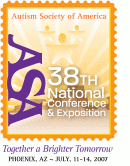 |
The ASA's 38th National Conference on Autism Spectrum Disorders (July 11-14, 2007) of ASAThe Westin Kierland Resort & Spa, Scottsdale, AZ |
| For a complete author index with session numbers, please click here | |
| Thursday, July 12, 2007: 3:00 PM-4:15 PM | |||
| Herberger Ballroom 4 & A | |||
| #2967- Preparing Individuals with ASD for the Workplace- ASHA CEU Session* | |||
| Current research indicates that what employers value most are “soft skills,” those skills that are not technical in nature, but interpersonal (the "hidden curriculum") How do we teach these skills to individuals with autism spectrum disorder (ASD)whose disability is social in nature? The first step is learning to understand individuals with ASD and the needs of the workplace to which they will transition. The second lies in learning to identify and teach to the hidden curriculum. | |||
| Presenters: | - Dr. Peter Gerhardt is the President and Chairman of the Scientific Council of the Organization for Autism Research. Dr. Gerhardt serves on several advisory boards including The Autism Society of America, MAAP Services and COSAC. He is an international presenter on the topic of, and has an extensive professional background in, transitions to adulthood and related issues for individuals on the spectrum. Dr. Gerhardt received his doctorate from Rutgers University Graduate School of Education. He is currently editing the results of the 2006 OAR Applied Research Convocation entitled "Evidence-based Practice and Intervention with Adolescents and Adults with Autism Spectrum Disorder".
- Donna Owens, M.A., Family Services Administrator for the Ohio Center for Autism and Low Incidence(OCALI), has worked with education, MRDD, mental health, and parent/consumer agencies. She directed a statewide pilot program serving transition- aged youth with severe developmental disabilities and challenging behavior. She is the author of Ohio’s Supported Employment Training Manual and has presented at state and national conferences including: TASH, the Region 4 Parent Technical Assistance Conference, Ohio’s Career Development Conference and regional and district-wide conferences on Supported Employment and Positive Behavior Support. | ||
|
| |||
|
This session will address the following objectives: Identify skill areas most valued by employers; discuss how the characteristics of autism spectrum disorder match the workplace needs;identify the hidden curriculum of the workplace; and review strategies to teach the hidden curriculum, (what employers call “soft skills”) critical to the employment success of individuals with ASD. This session will begin with a description of the current research on the workplace that individuals with ASD who are graduating in the next 5 years are likely to face. Presenters will review the results of the research of the Employer Assistance & Recruiting Network (EARN), funded by the U.S. Department of Labor's Office of Disability Employment Policy. This research focused on identifying today's “hottest” job sectors and the primary workforce issues that employers must address today. Employers identified the skills they value most in employees as “soft skills.” These are not technical skills, but skills related to a potential employee's work ethic, courtesy, ability to team with others, self discipline and self confidence, ability to fit into the work culture, and ability to communicate with others. The skills that employers report that they value refer to those of the “hidden curriculum,” the set of rules or guidelines that are often not directly taught, but are assumed to be known. While many individual's with ASD may possess the ability to complete a discrete set of job tasks, their inability to identify and respond appropriately to the requirements of the hidden curriculum will cost them the opportunity to perform in the workplace. This requires that all educators involved in transition planning become familiar with the requirements of today's job market. Teachers, parents and IEP teams must focus educational planning on the identified soft skills or hidden curriculum and target this skill acquisition prior to graduation. For job developers and vocational rehabilitation counselors who are currently seeking to support the employment of adults with ASD, training programs must be developed and implemented to teach the skills embedded in the hidden curriculum. The literature now contains various strategies that are effective in teaching the hidden curriculum. A variety of these will be reviewed and considered in terms of their application to transition planning and job training. Some of these include: Situation-Options-Consequences-Choices-Strategies-Simulation (Jim Roosa), Social Stories (Carol Gray), Comic Strip Conversations, (Carol Gray), and Power Cards (Elisa Gagnon). Strategies for direct teaching of the hidden curriculum skills important to the workplace will be covered as well including the use of the Incredible 5 Point Scale (Kari Dunn Buron) as a mechanism for behavior modulation. The presenters will also review strategies for preparing individuals for the workplace. These include: making a good job match by identifying work readiness, work preferences and necessary accommodations to support the individual. Sometimes these accommodations can include co-worker training and job carving to make the match a successful one. In addition, current practice indicates that follow-up activities can be critical to support the ongoing employment of those on the spectrum. Aspirations is an ongoing training and support group, a program of Nisonger Center at The Ohio State University, which has been successful in providing guidance and support to help individuals deal with day-to-day workplace situations. Mechanisms for providing training and support to adults will be as important as providing initial skills training during their school or work preparatin programs. We have the workplace information to guide us and the strategies necessary to prepare individuals with ASD for employment. We also know strategies to support these individuals on an ongoing basis in the workplace. When we use this information and implement these strategies, we will make a significant difference in helping these individuals become successful employees and we will be able to help employers address their own workplace concerns. |
|||
See more of General Submissions
See more of The ASA's 38th National Conference on Autism Spectrum Disorders (July 11-14, 2007)